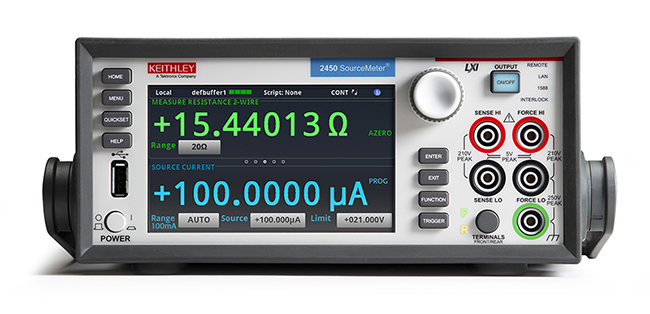

Keithley partners with element14 to supply engineers with instruments to test and review, and we recently provided three Keithley 2450 SourceMeter® Source Measure Unit (SMU) instruments to engineers. Below are excerpts from their RoadTest reviews, which can be read in full on the element14 website.
During his RoadTest element14 user lui_gough, alias of Dr. Gough Lui, ran a number of tests using the 2450, including a battery discharge test and device characterization. Lui noted that he was able to run a battery discharge test easily using just the SMU and an external battery simulator, which “resulted in a capacity value within 2mAh with an expected sourcing error of around 9mAh, which was extremely impressive.”
While running tests, Lui also took advantage of KickStart, a simple and intuitive application from Keithley that quickly replicates tests and creates graphs that compare results, which can be easily exported. Using KickStart and the 2450 SMU, Lui characterized a variety of devices, including diodes, LEDs, metal-oxide varistors (MOVs) and NE-2 neon bulbs in forward and reverse bias.

“The data illustrated the superior low-level capabilities of an SMU compared to power supplies and digital multimeters I had previously used, with the background current noise in the tens of picoamps even when using banana leads on the front panel,” said Lui. “Previously, I was only able to measure down into the hundreds of nanoamps.”
In his review, Lui notes that the 2450 SMU “makes performing many tests easier due to tight integration and synchronisation, reduces the footprint on the bench or in the rack, improves accuracy and testing speed and reduces the wiring set-up necessary.”
But for Lui, the biggest advantages of the 2450 are its large memory buffers, dual-dialect support for SCPI commands and Test Script Processor (TSP) commands, and the implementation of TSP scripts through the Test Script Builder (TSB). As Lui says, the traditional SCPI model causes bottlenecks, which limit the speed at which these systems can operate. But the 2450 makes the scripting language interpreter accessible to the user, so test logic can be executed on the instrument directly. This combined with the 2450’s ability to debug scripts interactively through TSB, means engineers have a full Eclipse-based development environment for TSP scripts. Because these scripts can be saved on a USB, users don’t need to use a PC if they don’t want to.
Lui wasn’t the only user who was impressed by the TSP and KickStart software. The element14 user neuromodulator appreciated that he was able to use KickStart to see the data as it was being measured so he could interrupt the measurement if he realized the parameters weren’t set correctly.
He was also impressed by the support of the TSP scripting language and the flexibility it provides.
“The ability to run scripts in standalone also increases the speed at which the instrument can react and perform tasks, as there is no latency caused by sending data back and forth to a computer,” he writes. “This may not be important in a laboratory environment, but could have a major impact in production testing.”
Neuromodulator ran a number of different experiments, including solar cell characterization, battery characterization, DC-DC converter efficiency measurement, LED characterization, capacitor characterization and remote monitoring. During these experiments, he took advantage of the 2450’s innovative graphical user interface and advanced touchscreen technology.

Unlike conventional instruments, the 2450’s five-inch, full-color, high-resolution touchscreen optimizes overall speed and productivity, so engineers can learn faster, work smarter and invent easier.
According to neuromodulator review, “The front panel interface is intuitive and simple to navigate and use. The menu hierarchy is very shallow, making the access to every options very quick…The GUI supports different gestures such as dragging and pinch-to-zoom, and it feels almost as intuitive as using a smartphone.”
According to waleedelmughrabi's review, prior to receiving the SMU, he never thought to purchase one. However, after testing it, he wonders how he ever managed without one.
Using the 2450 to test protection components (Ideal diode and Schottky), PV characterization and a high voltage test, neuromodulator says, “The device is packed with features that are definitely a great help to any engineer to verify calculations and simulations. In my case its main advantage is the quick test setup. I believe it can also be very helpful for quality control process for production of semiconductors, thermistors, solar cells, and other components.”
Conclusion
Keithley’s 2450 SourceMeter Source Measure Unit (SMU) is a versatile instrument that allows engineers to perform Ohm’s law testing more easily than ever before. Well-suited for characterizing modern scaled semiconductors, nanoscale devices and materials, organic semiconductors, printed electronics, and other small-geometry and low-power devices, the 2450 is inherently easy to use for basic and advanced measurement applications, regardless of an engineer’s experience level with SMU instruments.


